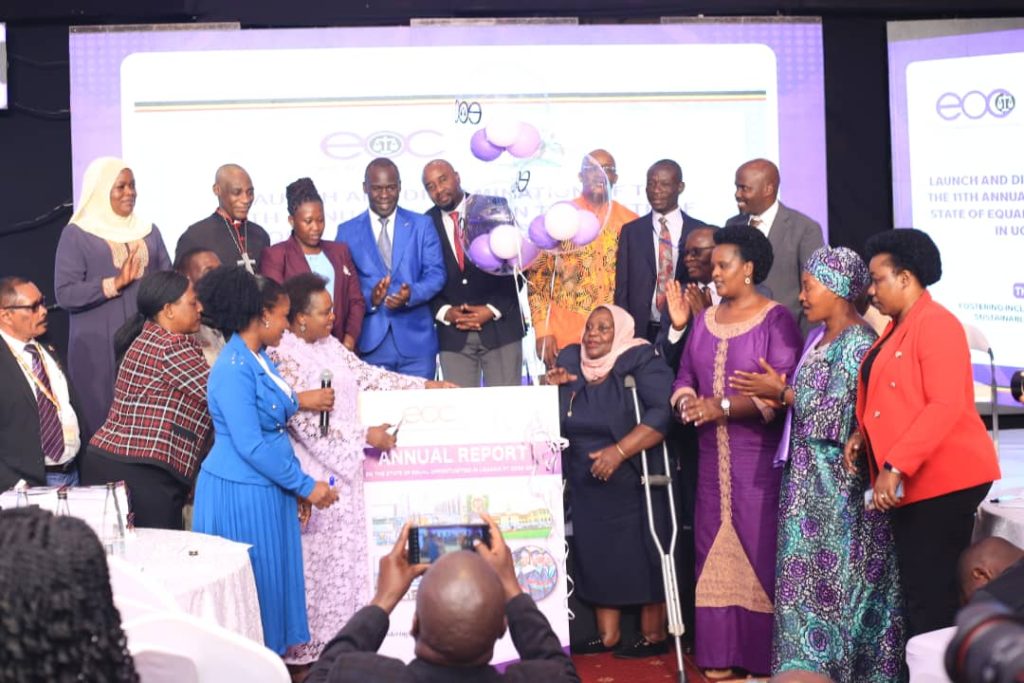
Foreword
I have the honour to present to you the 10th Annual Report on the State of Equal Opportunities in Uganda in tandem with Section 24 (2) and (3) of the Equal Opportunities Commission Act, 2007.
The theme for this year’s Report is “Fostering Inclusive Growth, Employment, and Wealth Creation through Equitable Participation of all Ugandans in Government Interventions and Programs”.
The above theme is aligned to the National Budget Strategy for the FY 2022/2023, which is anchored on the National Development Plan III and the NRM Manifesto, among others. The Strategy aims at mitigating the impact of Covid 19 on business activities, livelihood support and full recovery of the economy.
This year’s report highlights Compliance of Government programs with gender and equity requirements in planning and budgeting, the state of equal opportunities in political participation, access to the major factors of production, distribution of the infrastructure loans obtained by Government, access to employment among MDAs, the state of equal opportunities under Human Capital Development especially in health (regional distribution of hospitals and specialists), and education( access to UPE and USE and the distribution of higher students loan scheme). The last chapter of the report presents the conclusion and key recommendations whose implementation will facilitate redressing of the cited imbalances and inequalities in the Country.
The Report showcases the various ways in which Equal Opportunities Commission work at National and Local Government levels to operationalize Article 32 of the Constitution of the Republic of Uganda, 1995 (as amended); Sections 14 and 15 of the Equal Opportunities Act, 2007; Sections 9(6), 13(11) and 13(15) of the Public Finance Management Act, 2015; the aims and objectives of the 2030 Agenda for Sustainable Development and the Country’s Vision 2040 into reality, taking into account gender and equity compliance as well as balanced development.
During the midterm implementation of NDP111, the Commission has tracked the various interventions and indicators under the country’s vision 2040; National and Programme Budget Framework Papers, Ministerial Policy Statements; alongside the targets of the SDGs. This aimed at establishing the extent at which service delivery has inclusively benefited all people especially the most vulnerable and how their standard of living has been transformed. The main premise of this report is that without inclusive and equitable access to various NDP111 interventions, the national development efforts will be compromised and the standards of living among all people especially the marginalized and poor – including their access to social services may not be raised sustainably.
The elimination of all forms of discrimination and inequalities is critical to addressing Uganda’s development concerns especially for the vulnerable groups including: Children, Youth, Women, Older Persons, Persons with Disabilities, Ethnic Minorities, People living with HIV and AIDS, Rural and urban poor among other categories of marginalized persons. The critical role played by Equal Opportunities Commission must be upheld and supported because the country can’t realize its transformation agenda without attending to the needs of all people especially the vulnerable people which are often ignored and regarded as being in the details.
During this reporting period, the Commission interfaced with key stakeholders among which included both state and non-state actors on the various interventions to addressing the plight of all people especially the marginalized and vulnerable groups on equity in access, participation and benefit from service delivery. This report therefore highlights the implementation progress, policy gaps, best practices and lessons learnt as well as recommendations towards redressing imbalances and promoting equal opportunities for all as well as balanced development.
It is my sincere hope that the analytical state of equal opportunities in the programmes under review presented in this report will be utilized by the various State and Non-State actors in a concerted effort to eliminate all forms of discrimination and inequalities. We thank His Excellence the President of the Republic of Uganda for spearheading balanced development through industrialization, digitalization and on our part as Equal Opportunities Commission we have developed vote specific guidelines, to ensure gender and equity compliance.
The Commission is fully committed to work with all stakeholders to ensure that they implement the recommendations highlighted in this report in order to realize a just and fair society wherein all persons have equal opportunity to participate and benefit in all spheres of political, economic, social and cultural life, and to realize the Country’s transformation agenda of moving people from peasant to money economy.
FOR GOD AND MY COUNTRY
Hon. Safia Nalule Juuko
CHAIRPERSON.

